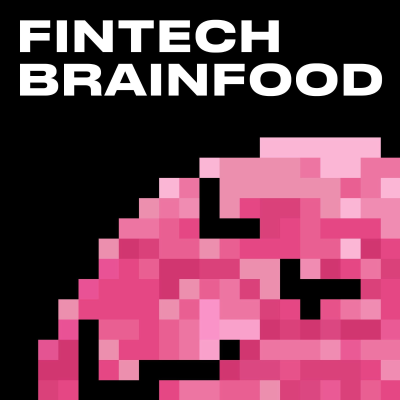
Fintech Brainfood
Podcast de Simon Taylor
Este podcast se puede escuchar gratuitamente en todos las plataformas y en la app de Podimo sin necesidad de suscripción.
Todos los episodios
7 episodiosAfter speaking to the CEOs of Ramp, Brex, and Mercury, my first instinct is to find other nerds with whom to share my thoughts. Immediately, I thought of Alex, and then I needed to bring some class to proceedings. I called my old friend Cokie (an OG and still my favorite Fintech content writer). This is the most fun, relaxed, and engaging conversation I’ve had about Fintech in a long time. I’m not even going to try and sell it to you. Just take a listen. Who knows if or when I’ll do season 2, but this has been a fun side project. Get in touch if you want to know more about me, my day job at Sardine, or you have any feedback on season 1. Now back to your regular scheduled newslettering. ST.
This was perhaps the most intense conversation I can remember having. Incredibly efficient, scarily so. Focussed, intentional, direct. Why should you listen to this episode? This company arguably created a category. By focussing on offering high yield and higher deposit insurance at a time when banks were not, when interest rates began to rise, they capitalized on a generational market opportunity. Today Meow is known for its access to high-yield treasury, and while there are a few in this category none quite have the explosive growth that Meow has. This is a company that has lazer focussed on execution, channel partnerships, and go-to-market. I describe conversations I’ve had with Brandon like talking to a scalpel. He’ll get to the point so quickly and surgically it's often hard to keep up. Meow started offering high-yield access to Stablecoins but may have pulled off the mother of all pivots. Today Meow offers up to $125m in FDIC insurance through its deposit sweeps network, which is expanding internationally and the CEO even graced the pages of Forbes. What makes Brandon tick? What makes Meow work? And how are they building an enduring business
Unlike Ramp or Brex, Mercury started with the account and built the ultimate dashboard for early-stage and growth companies. Immad is the founder’s founder, serial entrepreneur, and angel investor, with over 300+ angel investments in his name (including Airtable, Substack, and Rappi). If anyone got the challenges growth companies have trying to operate a business while relying on traditional banking solutions, Immad is that founder. Where once startups could get an account, they had to pick between a specialist bank with a poor digital experience (like Silicon Valley Bank or First Republic) or a large one-size-fits-nobody larger bank. The choice was between the stability of a big bank or the expertise of a local specialist, and regardless of your choice, the digital user experience was horrendous. Mercury flipped the model and pioneered an entirely different Go To Market. Taking the best of what SVB and FRB did - like access to debt capital markets, VCs, and partners and helping balance that with more FDIC coverage and a single dashboard to manage and automate everything. Today Mercury is a BEAST. Recently announcing, 8 quarters of profitability with more money on the balance sheet than ever raised (>$163m), 200k customers and 640 staff. Despite some challenges like the banking crisis and now the BaaS crisis, Mercury continues shipping new products like financial workflows powered by the bank account and personal accounts for founders. So what makes Mercury special? And what’s under the hood of one of Fintech’s fastest-growing companies? Find out in this Fintech Brainfood Interview.
In the crowded world of B2B Fintech Neobanks and platforms, did the world need one more? In 2021 the peak of Fintech mania Arc launched and on the surface risked looking like just another B2B Fintech. Since then, their product velocity, growth and trajectory has made them stand out. Their approach is unique. In the post-Silicon Valley Bank world, they have the advantage of arriving late and fixing the things others missed. Their core offering is a dashboard for startups for treasuries, operations and reserve accounts. This is a big bank like proposition, but with all of the features modern startups offer, in one place. What caught my eye is their moves into lending. Yes, they offer revenue finance and working capital, but they're pushing the boundaries with venture debt, asset-backed loans, and now, even helping their clients access third-party lending. This is a curated white glove and full suite. Can such a small company pull that off? Especially given their well funded, capable competitors who have a head start and traction?
Brex created a category. Life before Brex was terrible for founders and growth businesses. The least worst option was Silicon Valley Bank which would offer a veneer of founder friendliness but with a terrible digital UX. Brex turned this on its head with corporate cards that just worked and removed the personal guarantee. It’s hard to understate the revolution this created in experience and the step change in productivity for businesses. Today a Series A company might have a finance team of 1, and maybe 2 by Series B. Today there are many competitors to Brex, but this is a multi-billion dollar valued juggernaut with a substantial lead in deposits and float. Brex started as the corporate card for startups, but today they’re expanding—with expense management, travel, business accounts, and bill pay. Can they win the race for the finance operating system of digital companies, and if so how? What makes Perdro tick? And how are they building an enduring business?
Disponible en todas partes
¡Escucha Podimo en tu celular, tableta, computadora o coche!
Un universo de entretenimiento en audio
Miles de pódcasts y audiolibros exclusivos
Sin anuncios
No pierdas tiempo escuchando anuncios cuando escuches los contenidos de Podimo.























